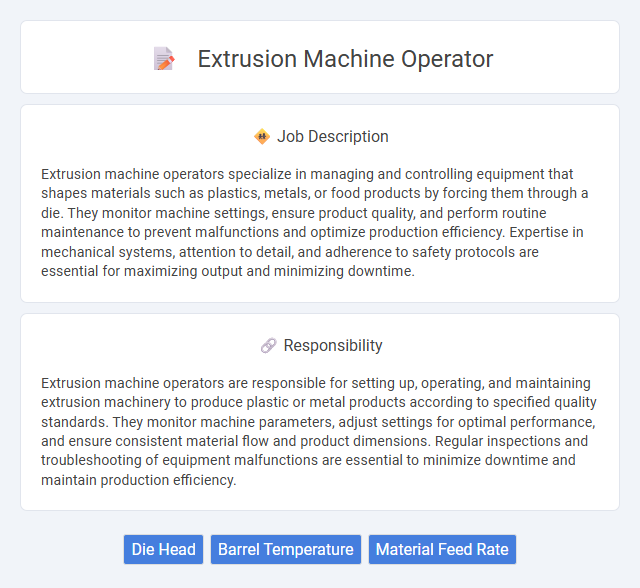
Extrusion machine operators specialize in managing and controlling equipment that shapes materials such as plastics, metals, or food products by forcing them through a die. They monitor machine settings, ensure product quality, and perform routine maintenance to prevent malfunctions and optimize production efficiency. Expertise in mechanical systems, attention to detail, and adherence to safety protocols are essential for maximizing output and minimizing downtime.
People with good manual dexterity and physical stamina are likely suitable for the extrusion machine operator role, as it involves handling machinery and monitoring production processes. Those who can maintain focus in repetitive tasks and follow strict safety protocols may have a higher probability of success in this job. Individuals with prior mechanical knowledge or experience in manufacturing environments are often better equipped to manage potential operational challenges efficiently.
Qualification
Extrusion machine operators typically require a high school diploma or equivalent, with specialized training in operating and maintaining extrusion equipment. Proficiency in mechanical troubleshooting, quality control standards, and safety protocols is essential for optimal performance. Experience with computer-controlled machinery and knowledge of production processes enhance job qualifications and career advancement opportunities.
Responsibility
Extrusion machine operators are responsible for setting up, operating, and maintaining extrusion machinery to produce plastic or metal products according to specified quality standards. They monitor machine parameters, adjust settings for optimal performance, and ensure consistent material flow and product dimensions. Regular inspections and troubleshooting of equipment malfunctions are essential to minimize downtime and maintain production efficiency.
Benefit
Operating an extrusion machine likely offers competitive wages and opportunities for skill development, which can enhance long-term career prospects in manufacturing. Employees may benefit from health insurance and retirement plans, common in industrial workplaces. Job stability is often probable due to consistent demand in sectors such as plastics and metal production.
Challenge
Operating an extrusion machine may involve frequent mechanical adjustments and troubleshooting, which can pose significant challenges for maintaining consistent product quality. The operator will likely encounter unpredictable variations in raw materials and machine performance, requiring sharp problem-solving skills and attention to detail. Managing these challenges effectively is essential to ensure smooth production and minimize downtime.
Career Advancement
Extrusion machine operators gain specialized skills in operating and maintaining machinery used to shape materials like plastics and metals, opening pathways to supervisory or technical roles. Mastery of precision techniques and understanding of production processes position operators for advancement into quality control, maintenance technician, or production management positions. Continuous training in automation technologies and safety standards enhances career prospects and earning potential within manufacturing industries.
Key Terms
Die Head
An extrusion machine operator specializing in the die head is responsible for setting up, adjusting, and maintaining the die head to ensure precise shaping and consistent product quality. Expertise in die head calibration, temperature control, and troubleshooting is essential for optimizing material flow and preventing defects. This role requires a thorough understanding of extrusion principles, die design, and real-time monitoring of the die head's performance.
Barrel Temperature
Maintaining precise barrel temperature is critical for extrusion machine operators to ensure optimal melt flow and product consistency. Operators monitor temperature zones along the barrel to prevent overheating or underheating, which can cause material degradation or poor extrusion quality. Accurate barrel temperature control significantly impacts cycle time, energy efficiency, and the structural integrity of extruded products.
Material Feed Rate
The extrusion machine operator controls the material feed rate to ensure consistent flow and maintain product quality during the extrusion process. Precise adjustment of feed speed directly impacts the dimensional accuracy and surface finish of extruded products, reducing material waste. Familiarity with feed rate parameters and real-time monitoring systems is essential for optimizing production efficiency and minimizing machine downtime.
 kuljobs.com
kuljobs.com